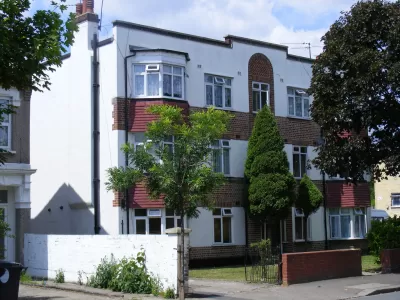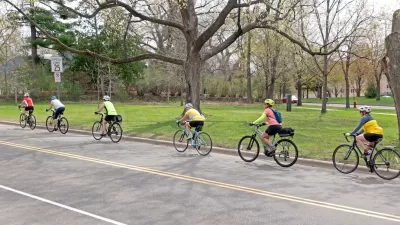Small-scale development on single lots is an alternative to the centralized mid-rise norm. But this kind of classic infilling may not be as easy as build-it-and-they-will-come.

Alex Cecchini gives us one of the standard densification techniques: "The Minneapolis Comprehensive Plan mostly calls for dense, mixed-use development along commercial corridors, and we see zoning that matches that goal. I don't think this is a wise strategy – there is limited land abutting these corridors, and many have a mix of rentals and multiple retail or commercial tenants that make lot assembly and redevelopment very difficult."
Instead, infilling could come about in a decentralized way, lot-by-lot. From the article: "Single lot development is important. It's a small-scale process, meaning more local developers (rather than national, publicly-traded ones) can take part. Profitable single lot development also bypasses the timely and costly process of lot assemblage with the city. Finally, it adds competition so landowners don't hold out for combined offers on combined lots. So, can it be done?"
Cecchini goes on to explore several challenges facing 2 to 3-story single-lot development. Unfriendly zoning codes and dubious demand economics might stand in the way of affordable housing independent from big developers.
FULL STORY: The Barriers to Small Scale Infill Development

Maui's Vacation Rental Debate Turns Ugly
Verbal attacks, misinformation campaigns and fistfights plague a high-stakes debate to convert thousands of vacation rentals into long-term housing.

Planetizen Federal Action Tracker
A weekly monitor of how Trump’s orders and actions are impacting planners and planning in America.

In Urban Planning, AI Prompting Could be the New Design Thinking
Creativity has long been key to great urban design. What if we see AI as our new creative partner?

Portland Raises Parking Fees to Pay for Street Maintenance
The city is struggling to bridge a massive budget gap at the Bureau of Transportation, which largely depleted its reserves during the Civd-19 pandemic.

Spokane Mayor Introduces Housing Reforms Package
Mayor Lisa Brown’s proposals include deferring or waiving some development fees to encourage more affordable housing development.

Houston Mayor Kills Another Bike Lane
The mayor rejected a proposed bike lane in the Montrose district in keeping with his pledge to maintain car lanes.
Urban Design for Planners 1: Software Tools
This six-course series explores essential urban design concepts using open source software and equips planners with the tools they need to participate fully in the urban design process.
Planning for Universal Design
Learn the tools for implementing Universal Design in planning regulations.
Gallatin County Department of Planning & Community Development
Heyer Gruel & Associates PA
JM Goldson LLC
City of Camden Redevelopment Agency
City of Astoria
Transportation Research & Education Center (TREC) at Portland State University
Jefferson Parish Government
Camden Redevelopment Agency
City of Claremont





























